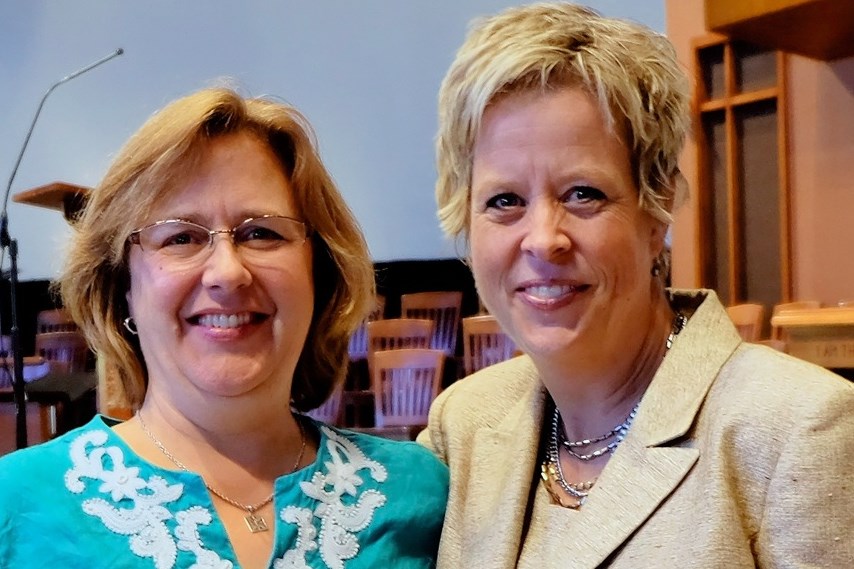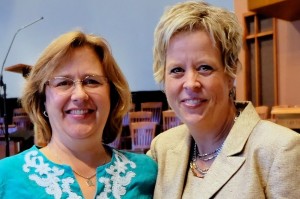GA Moderator and Vice Moderator Candidates: Kelly Allen and Leslie Murphy King
NOTE FROM THE DIRECTOR:
It’s Presbyterian Church (USA) General Assembly week on ecclesio.com. All three of the candidates standing for Moderator of the General Assembly, meeting in Detroit, Michigan, June 14-21, 2014, have written responses to questions from the Office of the General Assembly, to introduce themselves to the Commissioners and Advisory Delegates. One of the questions was on the Confession of Belhar, a matter that will come before this Assembly. I am grateful to serve on the Special Committee on the Confession of Belhar, and was particularly interested in the candidates’ responses to this question. On ecclesio.com this week, those responses will appear, with responses of both the moderatorial and vice moderatorial candidates to three more questions I posed, based on the three themes of the Confession of Belhar: unity, reconciliation, and justice. I thank all six fine disciples of Jesus standing for election in Detroit for their willingness to respond quickly to my questions, and look forward to your insights in response.
Question on the Confession of Belhar from the Office of the General Assembly (OGA):
The Special Committee on the Confession of Belhar has approached the C of B through the lenses of justice, unity and reconciliation. How might the Confession of Belhar help Presbyterians both confess historic and current brokenness within the church and seek authentic relationships for the present and the future?
Kelly: Unity is a dangerous word. How many times have we been in a group in which a strong leader or an outspoken participant proclaimed “unity” over the heads of the quieter voices? The emphasis on unity can become a way for the strongest to dismiss those of lesser strength as troublemakers.
The Belhar Confession’s “take” on unity rings true for me. In the confession, unity is linked with justice and reconciliation. In Belhar, unity does not concern who has the most important idea about Christ; unity is solidarity. This unity does not gloss over the agonies of suffering people or broken systems. This unity is bodies sharing the same space, the waters of baptism dissolving laws that keep people separate and impoverished, hope in Christ turning songs of praise into economic opportunities.
The letter to the PC(USA) accompanying the confession describes Belhar as a “cry from the heart.” The statement echoes the beautiful phrase in our Brief Statement of Faith that the Holy Spirit “gives us courage……to hear the voices of peoples long silenced.” This confession and its history allow us to do that.
Questions from ecclesio.com
We live in a time when people can choose to hear news, commentary, comedy, and discussions about faith that agree with their own, confirming their own points of view. Research shows that a majority of us do in fact make our viewing, listening and internet choices in this way. We see this in politics and we also see this in the church. How do we in the PCUSA confront this in ways that would work toward a more unified witness to Christ’s grace and mercy?
Kelly: A book entitled “How to Think Like Leonardo da Vinci” speaks of curiosity as one of da Vinci’s most evident personality characteristics. As I cross paths with people who think, live, and believe differently than I do, I find if I move into “curiosity mode” something wonderful often emerges. When I show curiosity about the life, fears, loves and gifts of another, I experience connection and grace. The moment becomes a witness to Christ’s grace and mercy. A unity we have not yet imagined becomes possible. A leader of a workshop I attended recently said, when dividing us into small groups, “Now, don’t try to fix people, just get curious about each other.” I am working on following his advice.
Leslie: Perhaps we rely upon others because we are a bit out of practice articulating our particular faith experience. We need an arena of practice that holds all that we value in close proximity for the unique work of integrative thinking. The very pragmatic way that this is done is in the solid Christian Education program of the local congregation. It is in the Christian Education classroom that we practice articulating our faith. Then, with integrative thinking, we practice how to bring our faith to bear upon current events at the local, national and global level. In this way, a traditional part of congregational life becomes a nexus for rediscovering civility and dialogue that builds community creatively.
Comment on a few justice issues in which you feel God calling you to respond, and to which you understand the church being called to respond.
Kelly: I lead a weekly Bible study in a detention facility for federal offenders awaiting trial and sentencing. As these men and women work their way through our “justice” system I am made personally and profoundly aware that those most entangled in this system are people we proclaim from our pulpits Jesus cares about the most. But the church has struggled to embrace the full humanity of the very same people: those with criminal records, severe mental illness, poor access to education, or racial and cultural backgrounds distinct from the majority. This embrace of full humanity merges evangelism and justice, reconciliation and friendship.
As I look again at this question, I am reminded of the strong and loving way I and others have been reminded over the years by leaders of the effort to fully include LGBT people in the life and ministry of the church, that people are not “issues.” The closer we are to true justice, the more we will know this in the depth of our bones.
Leslie:It appears that poverty, substance addiction and incarceration are fastened into a Gordian-like knot. Each contributes to the other in the hold that they have over God’s children, cultural resources and the way that we relate to one another across class lines. Increasingly, the ministry of the church will be to address complexes of problems.
Another justice issue is the plight of the small congregation in urban and rural contexts. With no malice intended, the economy of our denomination works against their revitalization.
How, after many congregations and pastors have left the PCUSA, can we work toward reconciliation?
Leslie:Congregations that experienced the split and retained their property are hot spots for learning. We do not yet know how to do effective reconciliation on this matter of pastors who lead congregations out of the denomination. In areas where there have been splits, learning teams might be sent in order to study the culture, relationships and history that gave rise to the split. We are behind the curve on this adaptive challenge but if we go into these hot spots in order to learn about reconciliation and relationship, we may have important insight for our next adaptive challenge within the church.
Kelly: I cannot think of a more profound answer to this question than is given by Leslie King, who is standing as vice moderator candidate with me. I would like to get one of those vans with a big megaphone on top of it and play a “hip hop” rendition of her answer while driving across the country. Telling each other the stories of our past, present and future as communities of faith and learning from failure and brokenness is strikingly Biblical. Trusting that new life rises, in particular, out of places of death, is the core of our faith in Jesus Christ.
The Rev. Kelly Allen is standing for Moderator of the General Assembly of the Presbyterian Church (USA). Kelly has chosen the Rev. Dr. Leslie Murphy King as her vice moderator. Learn more about Kelly and Leslie at the following sites:
Kelly’s website: http://kellyformoderator.com/
Kelly Allen’s Facebook page: https://www.facebook.com/kellyallenformoderator2014
Sites for Leslie Murphy King:
Blog: www.leslie66064.wordpress.com Twitter: https://twitter.com/WacoPastor
Church website: www.firstpreswaco.org



Pingback: GA Moderator and Vice Moderator Candidates - The Presbyterian Outlook